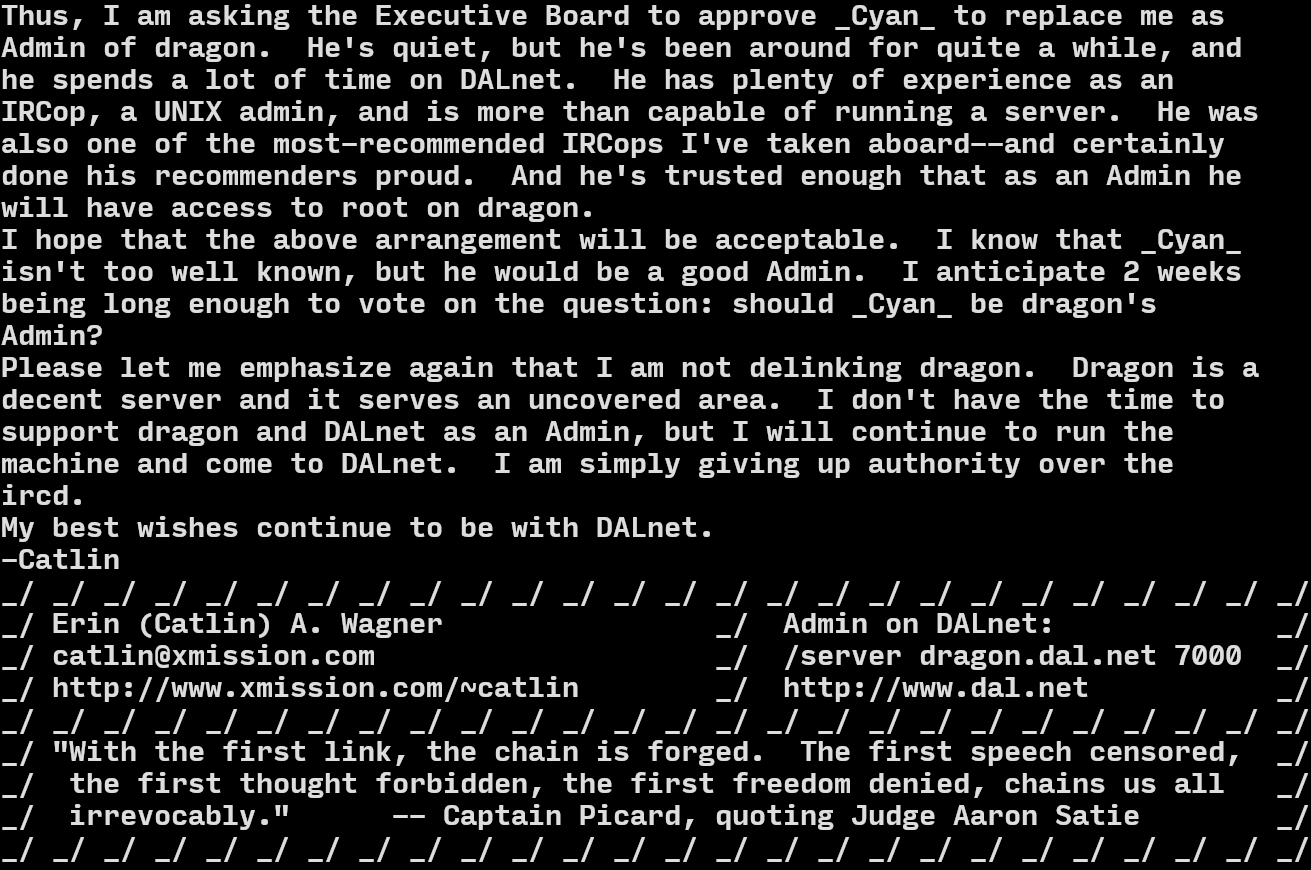IRC

I first signed on to IRC in 1994 and instantly fell in love with it. It’s still a passion of mine and you can still find me there. Odds are pretty good I’ll be there until the day I die. When I first found IRC, I was just a kid in a small town. The ability to talk to anyone from anywhere about any niche subject I was interested in was powerful and intoxicating. I learned more about computing from people on IRC than I ever did in any school.

For a few months I was admin of DALnet’s dragon.dal.net before the server owner pulled the plug. I then spent some time as an admin on EsperNet, where I acted in childish ways that I’m ashamed of now. These days I don’t have much interest in actually administering IRC servers anymore.
There was a time when IRC was leading edge so far as Internet communication technology goes. Simple things like DCC file transfers and actions (such as the /me command, or 0x01 ACTION) were extra-protocol additions that made IRC more useful. These days, the likes of Discord, Slack, and Riot all do a better job. They integrate rich media, voice chat, and just look and perform better overall. Considering these are all proprietary software that restrict your freedoms, that’s unfortunate. IRC had a long time to innovate, but it looks like the last real innovation on IRC was NickServ and progress has stagnated.
That won’t stop me from using it until I’m dead, though.
IRCv3 is a promising start. It features capability negotation and message tagging, opening up the possibility for actual rich media on IRC. A few IRC daemons exist out there using this new protocol, which is great to see. It’s got a long way to catch up with the likes of Discord though, but in the name of an open, free, and distributed Internet, I hope the IRCv3 working group gets there.

Finally, a word about the Synchronet IRCd. This has been copied verbatim from the documentation of the final version I maintained:
When I first started writing the Synchronet IRCd two decades ago, the intention was to create an IRC server that would be integrated with the hosting Synchronet BBS in some meaningful way. The most obvious way would be to have the BBS chat the same as IRC, so a user could flip between the two and still chat with the same people on either one. The idea would be to provide a seamless experience to the user so that they wouldn’t know they’re using IRC on the backend. This hasn’t materialized, and considering it’s been over two decades, I don’t expect it to.
With that being said, I’m still surprised two decades on that people are still using this thing on a daily basis. When I first started writing the IRCd, RFC1459 was only ten years old.
There have been some remarkable milestones. In 2021, ircstats.org reported that Synchronet IRCd accounted for 2.2% of all IRC servers on the IPv4 Internet. In 2022, that rose to 2.7%, a larger share than charybdis (used by Libera), or even the IRCd’s spiritual ancestor Bahamut (used by DALnet). Of course, this only happened because the IRCd is riding Synchronet’s coat-tails. It’s more a statement about Synchronet’s install base, but it’s still noteworthy.
The unfortunate reality of the IRCd is that despite two decades of development, it really doesn’t have any BBS-centric features that make it stand out from its peers. What’s the difference between a sysop running the Synchronet IRCd and a standalone IRCd written in C? Not much, really.
In many ways, MRC has achieved many of the goals that the IRCd originally set out to accomplish. If you want a more “BBS-like” experience in your chat, you should definitely give MRC a try.
As for me, after two decades of development, it’s time to step aside. I’m now in my forties and my priorities now are much different than they were when I started this thing. I’d like to thank DigitalMan and Deuce in particular. Without their help, the IRCd would never have been written, and it only exists because they helped carry me across the line.
When I first started writing the IRCd, I figured there’d be an influx of people interested in discussing the IRC protocol, design decisions, BBS integration, operations, etc. Those are all passions of mine and my twenty-something self was excited about contributing. Now that I’m two decades older I can see that this is a niche hobby that very few have a passion for.
As of January 2024, the IRCd will become unmaintained software. I hope that someone can take up the torch. Sysops should consider migrating their chat to MRC, a maintained IRC network, or a maintained IRCd.
Finally, I wanted to express my appreciation for authors of open source software as a whole. People like DigitalMan, Deuce, Linus Torvalds, and other open source authors are able to keep writing despite an immense amount of pressure and noise. They’re made of much tougher stuff than I am.
-Cyan.